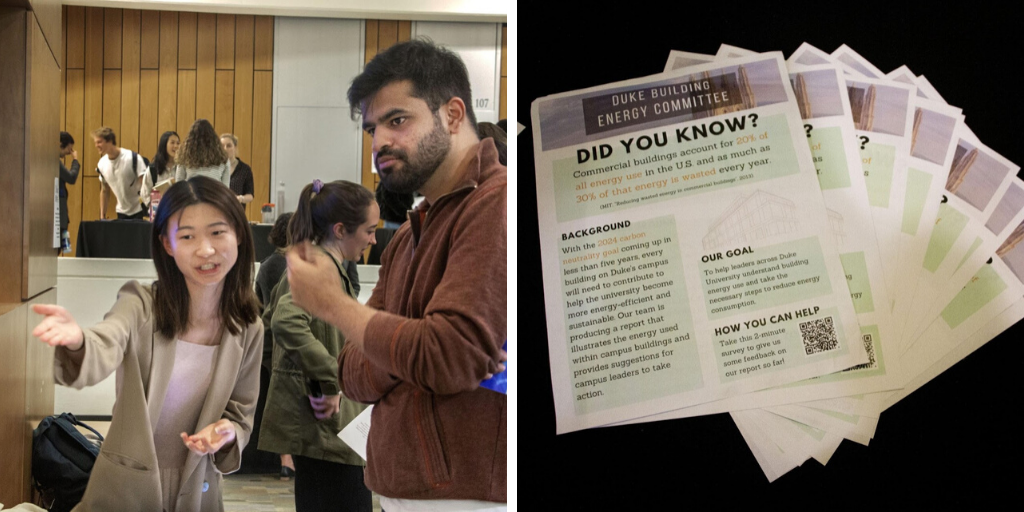How Much Energy Do Duke Campus Buildings Really Use?
By Joyce Huang ’22

Led by Billy Pizer, Jason Elliott and Zachary Johnson, our team is a continuation of a Summer 2019 Data+ project, where a small team of students and faculty, including current team leader Jason Elliott and team member Sophia Ziwei Zhu, worked to process and analyze utility consumption data for different buildings on Duke’s campus.
“This year marks my fifth Bass Connections project where I have advised groups of intelligent and curious students, with each project differing in focus area,” said Elliott, the Assistant Director of Sustainability at Duke. “I find that the interdisciplinary nature of these teams has led to wonderful, nontraditional outcomes such as a Solarize Duke program, an educational website about animal waste management around the globe and most recently energy reports for building on campus. Each of these projects has empowered students to push the boundaries of sustainability at Duke University and has led to some of the greatest highlights of my work.”

Building on the Data+ project team’s work, our team spent the beginning half of the semester researching energy usage within different buildings on Duke’s campus and building a sample report to illustrate this energy usage, which we presented at Energy Week.
After working on this project for the past semester, I feel like my team has done a really great job of taking everyone’s unique interests and skills into consideration. It has been very beneficial to gain data analysis and data visualization skills, which were two of the things I was hoping to learn through this project. And, as a Psychology major, I’ve enjoyed the challenge of having to create a report that conveys all the necessary data and statistics but is also compelling enough to inspire behavioral change. After spending the last few weeks of the semester interviewing building managers, we now must take a step back and think about what we need to change or add to our reports to better communicate the data.
It has been very beneficial to gain data analysis and data visualization skills, which were two of the things I was hoping to learn through this project. And, as a Psychology major, I’ve enjoyed the challenge of having to create a report that conveys all the necessary data and statistics but is also compelling enough to inspire behavioral change.
After receiving feedback on the report from Energy Week participants, our team produced customized building energy usage reports for the Sanford School of Public Policy, the Nicholas School of the Environment, the Fuqua School of Business, the Westbrook Building (Divinity School), the Law School, the Fitzpatrick Center and the French Family Science Center.
“This team allowed me to explore new fields like data visualization while applying academic interests on an administrative scale at Duke,” said Carsten Pran ’22. “I really enjoyed working on a project with other undergraduate students as well as faculty and graduate students.”

Senior Hazel Horvath reflected, “Bass Connections has been a great opportunity to connect with different Duke undergraduates, graduate students, faculty and staff around a shared interest: energy. Our project looks at the building energy use around campus and strives to find ways to reduce energy consumption.”
In the spring, our team hopes to work on creating a set of reports for different dormitory buildings to analyze their energy usage data and to provide recommendations for how they can improve their energy efficiency. My team members and I will also finalize their general building report format to automate the data analysis process, making the creation of future reports simpler.
Learn More
- Read more about this Bass Connections project team, Duke Building Energy Use Report.
- Check out the Summer 2019 Data+ project team affiliated with this Bass Connections project team.
- Mark your calendar for the Bass Connections Fair on January 24.